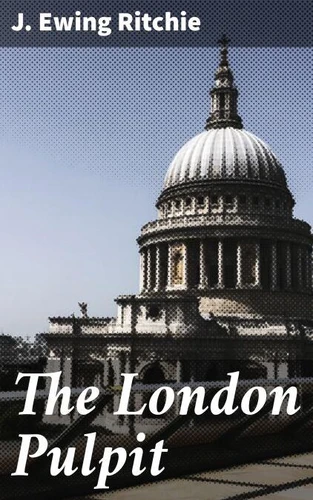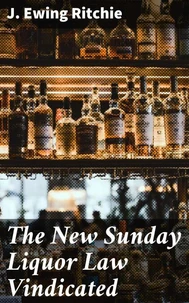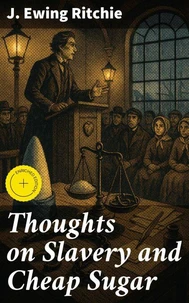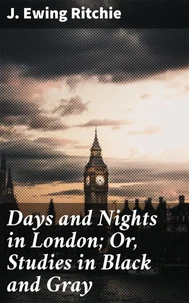The London Pulpit. Exploring Victorian London's Pulpit: Sermons, Preachers, and Religious Discourse in the Metropolis
Par :Formats :
Disponible dans votre compte client Decitre ou Furet du Nord dès validation de votre commande. Le format ePub est :
- Compatible avec une lecture sur My Vivlio (smartphone, tablette, ordinateur)
- Compatible avec une lecture sur liseuses Vivlio
- Pour les liseuses autres que Vivlio, vous devez utiliser le logiciel Adobe Digital Edition. Non compatible avec la lecture sur les liseuses Kindle, Remarkable et Sony
 , qui est-ce ?
, qui est-ce ?Notre partenaire de plateforme de lecture numérique où vous retrouverez l'ensemble de vos ebooks gratuitement
Pour en savoir plus sur nos ebooks, consultez notre aide en ligne ici
- Nombre de pages202
- FormatePub
- ISBN406-4-06-614441-8
- EAN4064066144418
- Date de parution20/12/2019
- Protection num.Digital Watermarking
- Taille586 Ko
- Infos supplémentairesepub
- ÉditeurGOOD PRESS
Résumé
In "The London Pulpit, " J. Ewing Ritchie presents a vivid tapestry of sermons delivered across the diverse ecclesiastical landscape of Victorian London. This work skillfully intertwines theological exploration with social commentary, addressing contemporary issues such as poverty, morality, and societal change. Ritchie'Äôs prose is characterized by its eloquence and accessibility, reflecting the oratorical grandeur and emotional resonance of the sermons themselves.
Set against the backdrop of a rapidly industrializing society, the narrative captures the interplay between faith and the pressing concerns of urban life, making it a vital study of the religious experience in a pivotal period of British history. J. Ewing Ritchie, a journalist and social reformer, drew upon his extensive observations of London'Äôs socio-economic challenges to inform his writing. His background in journalism honed his ability to convey complex ideas with clarity, while his commitment to social justice informed his critique of the societal conditions his contemporaries faced.
This blend of personal conviction and observation imbues "The London Pulpit" with both authenticity and relevance, as Ritchie strives to bridge the chasm between the sacred and the secular. This book stands as a crucial resource for readers interested in the intersections of faith, society, and literature during the Victorian era. Ritchie'Äôs insightful exploration of these dimensions invites reflection on the enduring power of the pulpit in shaping moral discourse, making it a compelling read for historians, theologians, and those intrigued by the moral landscapes of urban life.
Set against the backdrop of a rapidly industrializing society, the narrative captures the interplay between faith and the pressing concerns of urban life, making it a vital study of the religious experience in a pivotal period of British history. J. Ewing Ritchie, a journalist and social reformer, drew upon his extensive observations of London'Äôs socio-economic challenges to inform his writing. His background in journalism honed his ability to convey complex ideas with clarity, while his commitment to social justice informed his critique of the societal conditions his contemporaries faced.
This blend of personal conviction and observation imbues "The London Pulpit" with both authenticity and relevance, as Ritchie strives to bridge the chasm between the sacred and the secular. This book stands as a crucial resource for readers interested in the intersections of faith, society, and literature during the Victorian era. Ritchie'Äôs insightful exploration of these dimensions invites reflection on the enduring power of the pulpit in shaping moral discourse, making it a compelling read for historians, theologians, and those intrigued by the moral landscapes of urban life.
In "The London Pulpit, " J. Ewing Ritchie presents a vivid tapestry of sermons delivered across the diverse ecclesiastical landscape of Victorian London. This work skillfully intertwines theological exploration with social commentary, addressing contemporary issues such as poverty, morality, and societal change. Ritchie'Äôs prose is characterized by its eloquence and accessibility, reflecting the oratorical grandeur and emotional resonance of the sermons themselves.
Set against the backdrop of a rapidly industrializing society, the narrative captures the interplay between faith and the pressing concerns of urban life, making it a vital study of the religious experience in a pivotal period of British history. J. Ewing Ritchie, a journalist and social reformer, drew upon his extensive observations of London'Äôs socio-economic challenges to inform his writing. His background in journalism honed his ability to convey complex ideas with clarity, while his commitment to social justice informed his critique of the societal conditions his contemporaries faced.
This blend of personal conviction and observation imbues "The London Pulpit" with both authenticity and relevance, as Ritchie strives to bridge the chasm between the sacred and the secular. This book stands as a crucial resource for readers interested in the intersections of faith, society, and literature during the Victorian era. Ritchie'Äôs insightful exploration of these dimensions invites reflection on the enduring power of the pulpit in shaping moral discourse, making it a compelling read for historians, theologians, and those intrigued by the moral landscapes of urban life.
Set against the backdrop of a rapidly industrializing society, the narrative captures the interplay between faith and the pressing concerns of urban life, making it a vital study of the religious experience in a pivotal period of British history. J. Ewing Ritchie, a journalist and social reformer, drew upon his extensive observations of London'Äôs socio-economic challenges to inform his writing. His background in journalism honed his ability to convey complex ideas with clarity, while his commitment to social justice informed his critique of the societal conditions his contemporaries faced.
This blend of personal conviction and observation imbues "The London Pulpit" with both authenticity and relevance, as Ritchie strives to bridge the chasm between the sacred and the secular. This book stands as a crucial resource for readers interested in the intersections of faith, society, and literature during the Victorian era. Ritchie'Äôs insightful exploration of these dimensions invites reflection on the enduring power of the pulpit in shaping moral discourse, making it a compelling read for historians, theologians, and those intrigued by the moral landscapes of urban life.











